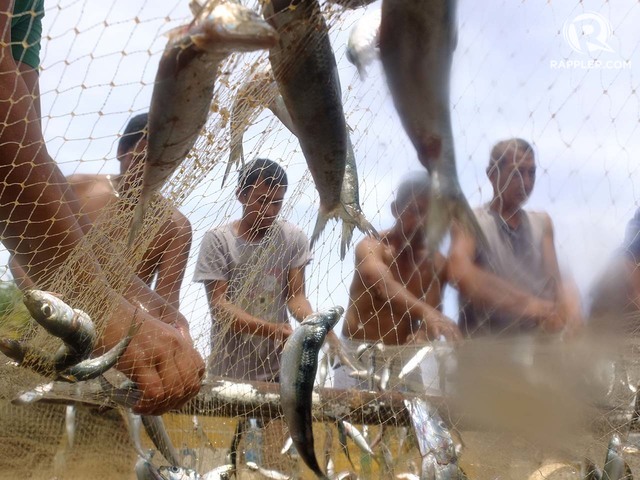Crews of two major canned sardine companies have been armed and trained as 'special CAFGU' to guard the waters off the Zamboanga Peninsula, says the military

RESERVE FORCE. The military enlists the fishing crews of some big sardine companies as a paramilitary force to help guard against security threats in the Sulu Sea. Photo by Bobby Lagsa/Rappler
Hard-pressed to fend off bandits, pirates, and terrorists sneaking into the Philippines through the Sulu Sea, the military enlisted the help of at least two Zamboanga-based sardine companies' fishing crews as a "naval reserve" force.
These fishing crews have been accredited as "special Citizen Armed Force Geographical Units (CAFGU)" affiliated with the Philippine Navy Reserve Unit, said Armed Forces of the Philippines' Western Mindanao Command (Westmincom) chief Lieutenant General Cirilito Sobejana on Wednesday, September 18.
Foreign terrorists and bandits have been entering the Philippines through its maritime borders around Sulu and the Zamboanga Peninsula, security officials have said, and the Philippine Navy and Philippine Coast Guard do not have enough assets and personnel to constantly patrol the entire area.
"We have a very porous border, no? Napakalawak ng maritime domain (Our maritime domain is very vast)," Sobejana said in an earlier interview.
Sardine fishing crews were given basic military training and issued firearms, Sobejana said, and they are led by "regular soldiers" onboard their ships.
The enlisted crews are to alert the nearest Navy vessel or outpost in case of an intrusion. Although only full-fledged Navy officers are allowed to make arrests, the CAFGU "can take the appropriate action if [the situation] requires," Sobejana added.
The Westmincom chief said executives from some sardine companies have made an agreement with the Department of National Defense for the activation of the "special CAFGU."
Sobejana named Mega Fishing Corporation and Universal Canning Incorporated as two companies that have already lent fishing crews to the deal. Rappler sought confirmation from both companies, but they have yet to respond as of posting time.
"They are all registered. It's covered with [a] mission order, so this is all legal," Sobejana said.
Efforts with Indonesia, Malaysia
Sobejana met with his counterparts from Indonesia and Malaysia in Penang, Malaysia, from September 11 to 13 to discuss security issues in the Sulu Sea, where the 3 countries share maritime borders.
The loosely guarded area has been a transit point of smugglers, pirates, bandits, human traffickers, kidnappers, and terrorists.
Defense Secretary Delfin Lorenzana earlier said some foreign terrorists likely sneak into the Philippines aboard boats in the Sulu Sea.
In the meeting in Penang, security officials agreed that each of the 3 countries would set up a maritime command center on an outpost facing the Sulu Sea. The centers will each have an Indonesian, Malaysian, and Filipino officer on hand to share information and to alert whichever country has assets and troops nearest any intrusion or aberration.
The Philippines' maritime command center will be in Panglima Sugala, Tawi-Tawi, Sobejana said.
The Westmincom chief said he would push for additional monitoring stations on islands in the Sulu Sea, with personnel armed and equipped with radars, in order to spot and deal with security threats.
https://www.rappler.com/nation/240510-military-taps-sardine-fishing-crews-reserve-force-sulu-sea
Foreign terrorists and bandits have been entering the Philippines through its maritime borders around Sulu and the Zamboanga Peninsula, security officials have said, and the Philippine Navy and Philippine Coast Guard do not have enough assets and personnel to constantly patrol the entire area.
"We have a very porous border, no? Napakalawak ng maritime domain (Our maritime domain is very vast)," Sobejana said in an earlier interview.
Sardine fishing crews were given basic military training and issued firearms, Sobejana said, and they are led by "regular soldiers" onboard their ships.
The enlisted crews are to alert the nearest Navy vessel or outpost in case of an intrusion. Although only full-fledged Navy officers are allowed to make arrests, the CAFGU "can take the appropriate action if [the situation] requires," Sobejana added.
The Westmincom chief said executives from some sardine companies have made an agreement with the Department of National Defense for the activation of the "special CAFGU."
Sobejana named Mega Fishing Corporation and Universal Canning Incorporated as two companies that have already lent fishing crews to the deal. Rappler sought confirmation from both companies, but they have yet to respond as of posting time.
"They are all registered. It's covered with [a] mission order, so this is all legal," Sobejana said.
Efforts with Indonesia, Malaysia
Sobejana met with his counterparts from Indonesia and Malaysia in Penang, Malaysia, from September 11 to 13 to discuss security issues in the Sulu Sea, where the 3 countries share maritime borders.
The loosely guarded area has been a transit point of smugglers, pirates, bandits, human traffickers, kidnappers, and terrorists.
Defense Secretary Delfin Lorenzana earlier said some foreign terrorists likely sneak into the Philippines aboard boats in the Sulu Sea.
In the meeting in Penang, security officials agreed that each of the 3 countries would set up a maritime command center on an outpost facing the Sulu Sea. The centers will each have an Indonesian, Malaysian, and Filipino officer on hand to share information and to alert whichever country has assets and troops nearest any intrusion or aberration.
The Philippines' maritime command center will be in Panglima Sugala, Tawi-Tawi, Sobejana said.
The Westmincom chief said he would push for additional monitoring stations on islands in the Sulu Sea, with personnel armed and equipped with radars, in order to spot and deal with security threats.
https://www.rappler.com/nation/240510-military-taps-sardine-fishing-crews-reserve-force-sulu-sea

No comments:
Post a Comment
Note: Only a member of this blog may post a comment.